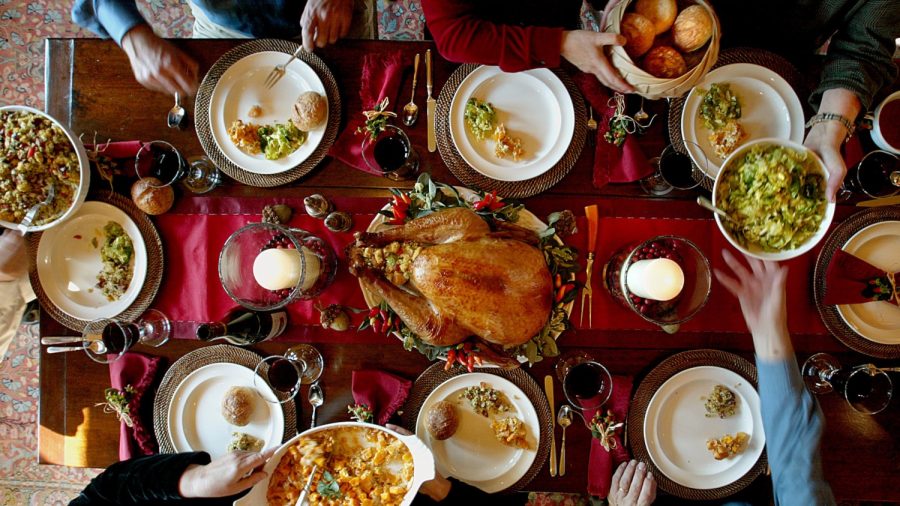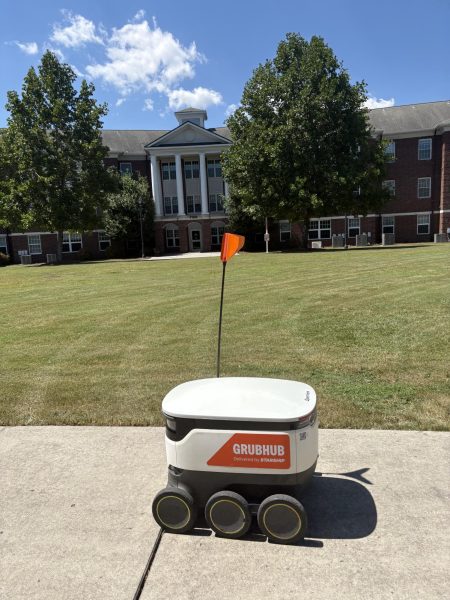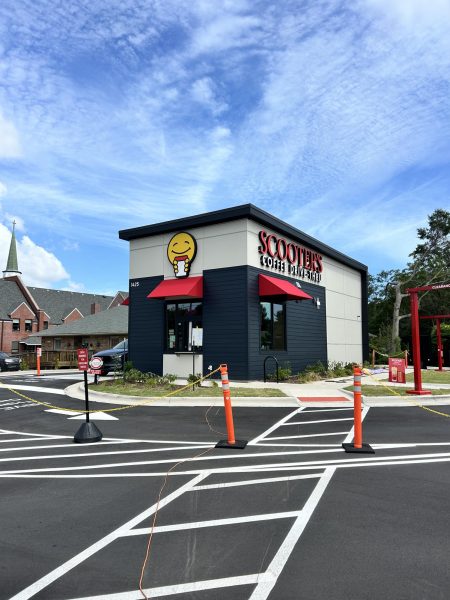14 tips for holiday healthy eating
TNS
A big Thanksgiving meal is an American tradition, but overeating on holidays happens in countries all over the world, according to a new study.
Nearly 10 Thanksgivings ago, I ate too much turkey and ended up on the couch nearly in tears from my own physical discomfort. Although I was around the age of 11, my mom likes to remind me of this embarrassing episode. When I was 13, I became a vegetarian. I did not eat any fish, red meat or poultry. Being a vegetarian from ages 13 to 18, I went five consecutive Thanksgivings without allowing myself a single taste of the simply seasoned, butter-rubbed turkey.
The holiday season can be a nerve-wracking time for health-conscious people, people who struggle with their eating habits and people who want to maintain a healthy diet. In fact, anyone can experience stress about eating during the holidays.
A 2016 HuffPost article was published discussing the concept of food anxiety during the holidays. “How to Reduce Food Anxiety Over the Holidays” was written by Vania Phitidis, an Intuitive Eating Counsellor. She explained how 95 percent of people who intentionally try to lose weight through restriction and over-exercising will regain weight; most people regain more weight than they lose.
“My goal is to help people find peace with food and their bodies, regardless of where their weight naturally settles,” Vania wrote in the article.
“How to Reduce Food Anxiety Over the Holidays” provides readers with six tips to help reduce the feeling of anxiety around food and eating during the holidays.
1. Expect to Overeat: Accept that it is the holiday season and you will eat more. Do not make yourself feel guilty or ashamed about your eating. Eat what you fancy when you are hungry. You can eat the left-over potatoes if that is what you want or a salad if that is what you want. Listen to what your body is hungry for.
2. Give Yourself Unconditional Permission to Eat: Eliminate food rules. These are the ideas you have about what to eat, when to eat and how much to eat. When you forbid yourself to eat a specific food, it is likely that you will begin to crave that food even more.
3. Let Yourself Eat Exactly What You Want: Eat exactly what it is you are craving and stop eating it when you feel satisfied.
4. Do Not Restrict or Over-Exercise to Compensate: Thinking about restricting yourself from eating is also a form of restriction. Do not restrict yourself from eating before or after a holiday meal. Do not exercise excessively before or after a holiday meal to compensate for what you eat or how much you eat.
5. Eat Mindfully: Relax and enjoy your food. Savor your food and slow down. Chewing your food helps you savor it and digest your food better. Be mindful of your hunger, satisfaction and enjoyment when you are eating. It might help to stop midway and ask yourself if you are still hungry or enjoying whatever it is you are eating.
6. Be Good to Yourself, No Matter What: Feelings of guilt, loathe or disgust towards your body or yourself are neither healthy nor effective sources of motivation. It is important to practice being compassionate and kind to yourself.
Chelsea Stant, UNC Wilmington’s Campus Dietitian, gave me her advice on eating healthy. Chelsea’s insight is also helpful for those who struggle with food anxiety during the holiday. She also shared her pieces of advice for eating healthy as a college student.
7. There is No Morality Behind Eating: What one eats and how much they eat has no effect on whether they are good or bad people.
8. You Can Eat Carbohydrates: Your body needs carbohydrates for energy. We do not need to consume the amount of carbohydrates the average American diet provides, but we still need them. Chelsea compares carbohydrates to gas in her analogy of driving a car.
“Carbs are the energy our body uses,” Chelsea said. “If our body was a car, carbs are the gas we are putting in our car. I tell people my car has a twelve gallon gas tank in it. I can’t put a gallon of gas in it and drive it for six weeks and then put forty gallons in it.”
9. “Clean-eating” is Not a Requirement for Healthy Eating: It does not require eating all raw, organic, whole foods to be healthy. You can season your vegetables and you can cook your food in butter and oil as long as you are mindful of the proportions.
10. Add Nutritious Foods to Your Meals: Eat what you are craving and what your body wants. Try to add fruits and vegetables to what you are eating when you can. Ask yourself what healthy items can I add to this?
“If I want a burrito, I add peppers, onion, lettuce and pico de gallo on that,” Chelsea said. “Try to see how many fruits and veggies you can put to the side of what you want to eat.”
11. Get Rid of the “All or Nothing” Mentality: Eating healthy requires sustainable eating. It is important to establish a balance. Becoming fit does not happen overnight and losing weight is a process that requires time and patience.
“Nutrition is about the cumulative effect of what you are eating,” Chelsea said. “If you don’t brush your teeth one night, you’re not going to wake up with cavities. If you do not brush your teeth every day for a consecutive month, you might experience some adverse symptoms. If you don’t brush your teeth for six consecutive months, you might develop severe dental hygiene problems.”
Chelsea uses this analogy to explain how people do not have to eat healthy all the time in order to be healthy. It is okay to eat pizza with friends or eat a funnel cake at a carnival. These choices do not make you an unhealthy person. Being healthy involves your habits throughout the course of time, not your single decision to eat pizza all weekend.
12. Eat Something for Breakfast: Chelsea encourages college students to eat something for breakfast every morning rather than skipping breakfast. Breakfast does not have to be a five-star meal. Simply grabbing a granola bar on the way out the door in a time-crunched morning is better than eating nothing. If your only option is to eat a donut in the morning, eat the donut. College students need fuel to start their day.
13. Aim to Eat Every Four to Six Hours: Try to eat every four to six hours of being awake. If you eat dinner around 6:00 p.m. and are awake past midnight, allow yourself to eat a small snack before you go to sleep. Eating something reasonable at night is completely okay.
14. Be Flexible with Food: As a college student, it can be difficult to make healthy choices all the time because of restraints like time and budgets. Do what you can when you can. It is okay to make decisions that are convenient for you. When you have the time, energy or money to make healthier choices, take advantage of it.
Food is a part of all our everyday lives. It should contribute positive experiences and enjoyment to people rather than feelings of fear or anxiety. Food can be a great way to bring people together and welcome conversation around a dining table or in social gatherings.
“Food is not just the nutrients it gives our body,” Chelsea said. “It is also very emotional, very social and very cultural.”
UNCW aims to bring students together through food by hosting Seahawk Supper. Seahawk Supper is a once-a-month family-style dining experience. It is held in Wagoner Dining Hall and is limited to 20 students. Students can RSVP for Seahawk Supper through WaveLink.












